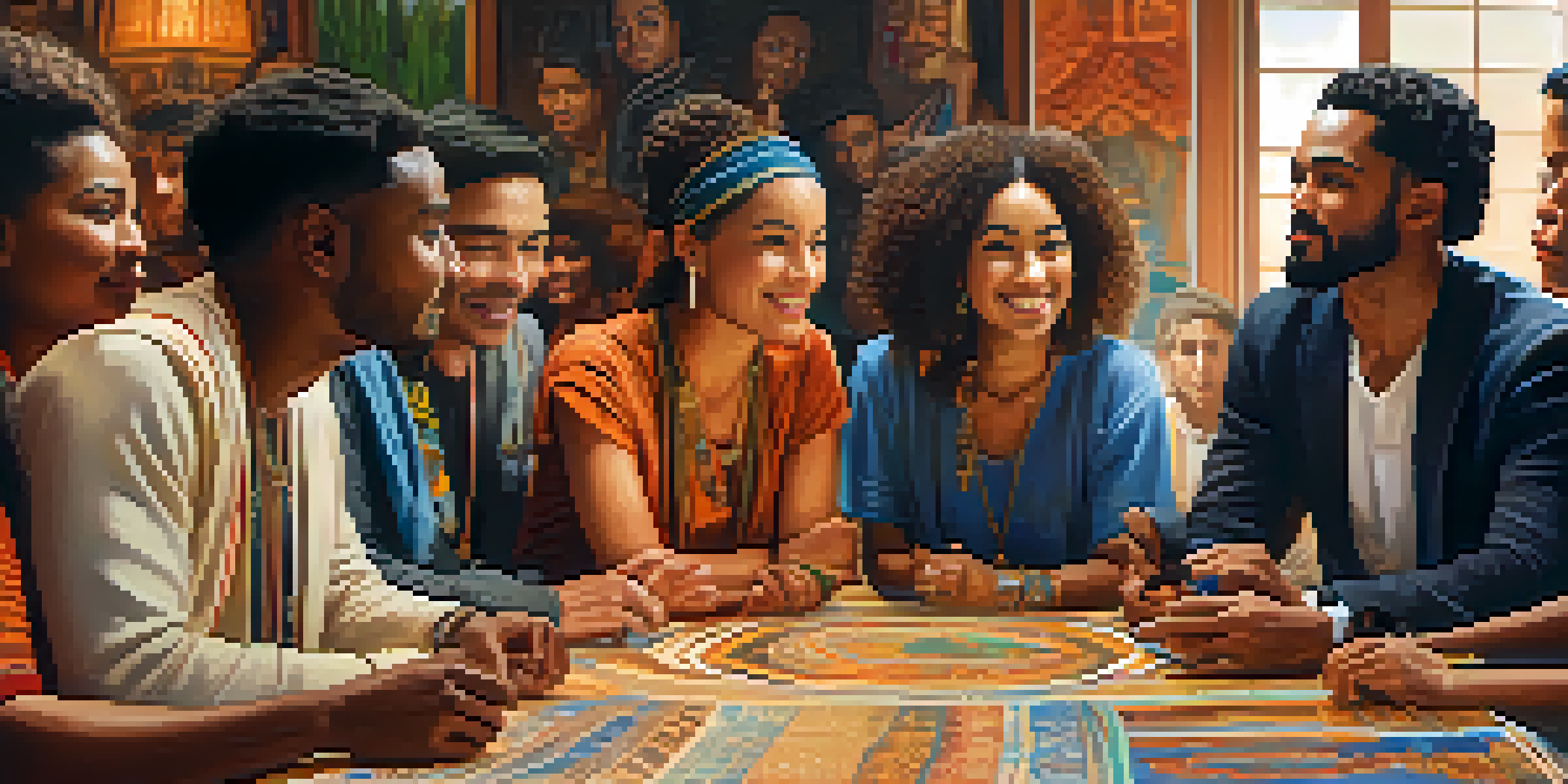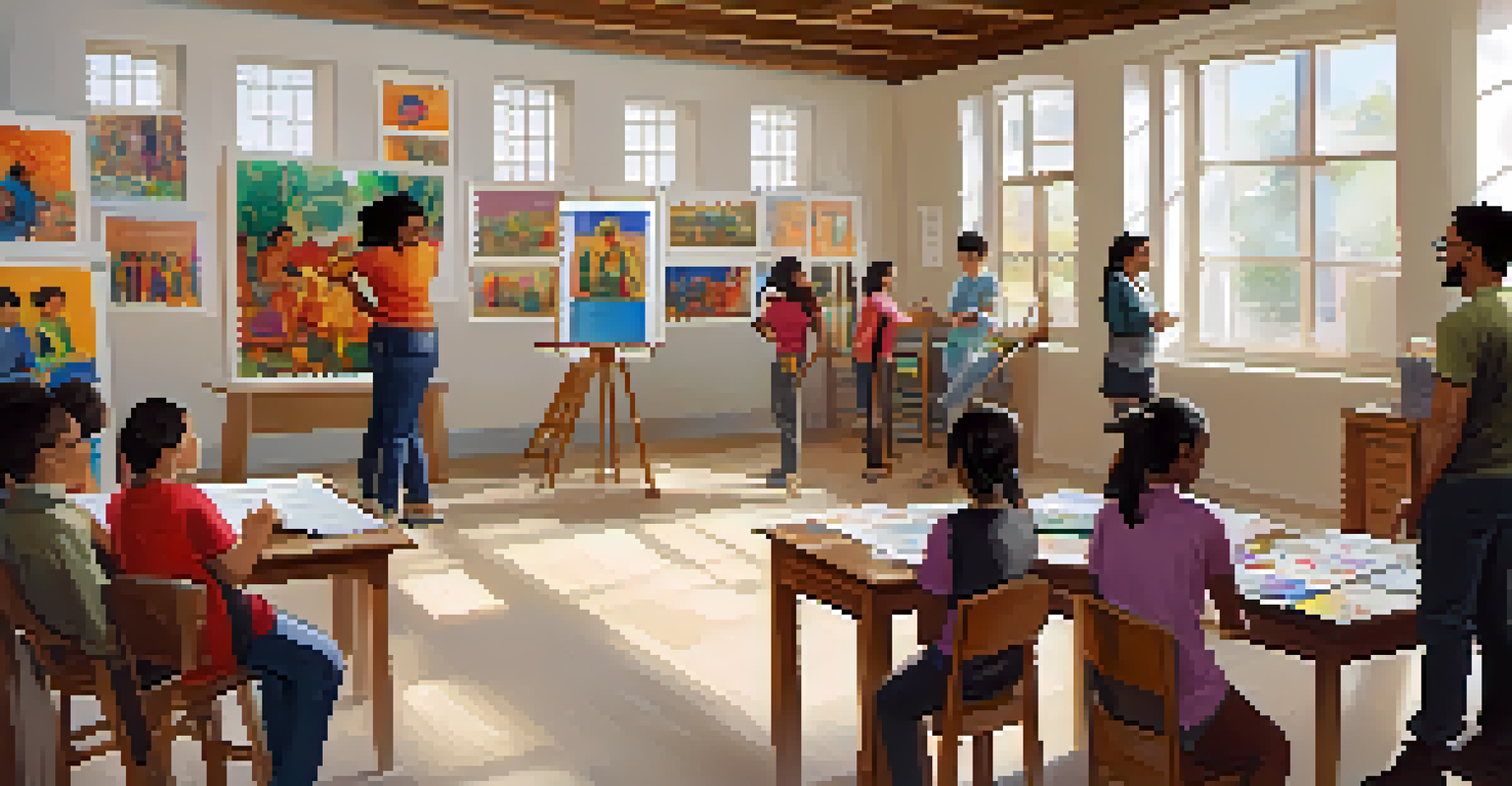The Role of Cultural Competence in Conflict Resolution

What is Cultural Competence and Why It Matters
Cultural competence refers to the ability to understand, communicate with, and effectively interact with people across cultures. It's not just about knowing facts; it’s about having an appreciation for differences that can influence interactions. This skill is crucial in today's diverse world, where conflicts often stem from misunderstandings rooted in cultural differences.
We all have different backgrounds and experiences that shape our views of the world, but it is our responsibility to understand those differences and embrace them.
When individuals possess cultural competence, they are better equipped to navigate conflicts that arise in multicultural settings. This understanding fosters empathy, allowing for more meaningful dialogue and resolution. Imagine trying to solve a puzzle without knowing the picture; cultural competence provides the context needed to see the whole image.
Ultimately, cultural competence enhances relationships by creating a foundation of trust and respect. This leads to more effective communication and collaboration, which are key components in resolving conflicts successfully. Without it, misunderstandings can escalate quickly, making resolution more challenging.
The Impact of Culture on Communication Styles
Communication styles vary significantly across cultures, and these differences can lead to conflicts if not understood. For example, some cultures value directness, while others may prioritize harmony and indirect communication. Recognizing these nuances can prevent misinterpretations that might otherwise escalate into disputes.

Consider a scenario where a straightforward approach is taken in a culture that prefers subtlety; the result may be perceived as aggression rather than honesty. This misalignment can create unnecessary tension. By being aware of these varying styles, individuals can adjust their communication methods to fit the context, fostering a more constructive dialogue.
Cultural Competence Enhances Trust
Understanding cultural differences fosters trust and respect, which are crucial for effective conflict resolution.
Incorporating cultural awareness into communication not only minimizes the risk of conflict but also enriches interactions. When people feel understood and respected, they are more likely to engage positively, leading to more effective conflict resolution strategies that acknowledge and embrace diversity.
Building Trust Through Cultural Understanding
Trust is a cornerstone of effective conflict resolution, and cultural understanding plays a pivotal role in establishing it. When individuals feel that their cultural identities are recognized and valued, they are more likely to open up and engage in constructive discussions. This trust acts as a cushion during conflicts, making resolution more achievable.
Cultural competence is a lifelong journey of learning, understanding, and appreciating the diverse world we live in.
For instance, in a workplace setting, understanding a colleague's cultural background can lead to a more empathetic approach during disagreements. This can be as simple as acknowledging different holiday practices or communication preferences, which fosters a respectful environment. Trust grows when people see that their cultural context is taken into account.
Ultimately, building trust through cultural understanding not only aids in resolving conflicts but also strengthens relationships over time. When individuals feel secure in their cultural identities, they contribute more positively to the resolution process, leading to outcomes that are satisfactory for all parties involved.
Strategies for Enhancing Cultural Competence
Enhancing cultural competence requires intentional effort and a willingness to learn. One effective strategy is to engage in active listening, which involves not just hearing words but understanding the meaning behind them. This approach allows individuals to grasp the cultural context that shapes others' perspectives.
Another strategy is to participate in cultural training or workshops. These educational experiences can provide valuable insights into different cultural practices and beliefs, which can be instrumental in reducing biases and fostering understanding. For example, role-playing exercises can simulate conflict scenarios, allowing participants to practice cultural competence in real-time.
Empathy Bridges Cultural Gaps
Empathy allows individuals to appreciate diverse perspectives, leading to more nuanced and collaborative solutions.
Lastly, seeking feedback from diverse groups can help individuals recognize blind spots in their understanding. By actively asking for input and being open to constructive criticism, a more nuanced perspective on cultural differences can be developed, ultimately leading to more effective conflict resolution.
The Role of Empathy in Conflict Resolution
Empathy is a crucial element in conflict resolution, especially in multicultural contexts. It allows individuals to step into someone else's shoes and see the situation from their perspective. This is where cultural competence intersects with empathy; understanding another culture enhances the ability to empathize sincerely.
For example, when a person recognizes the historical context of another's cultural experiences, they can approach conflicts with greater sensitivity. This kind of empathy not only helps to de-escalate tensions but also paves the way for more nuanced solutions that respect each party's background.
By fostering empathy through cultural understanding, individuals can create a more supportive environment for conflict resolution. This approach leads to solutions that honor the diverse perspectives involved, making the resolution process more collaborative and effective.
Case Studies: Successful Cultural Conflict Resolutions
Examining case studies can provide valuable insights into how cultural competence has successfully resolved conflicts. For instance, in a multinational corporation, a conflict arose between teams from different cultural backgrounds due to differing communication styles. The implementation of cultural workshops led to improved understanding and collaboration, ultimately resolving the conflict.
Another example can be found in community mediation programs that focus on cultural competency. These programs often bring in mediators who are trained in various cultural practices, which helps bridge gaps between disputing parties. The result is a more inclusive environment where all voices are heard and respected.
Training Boosts Cultural Awareness
Participating in cultural training can significantly enhance one's ability to navigate and resolve conflicts in multicultural settings.
These case studies illustrate that when cultural competence is prioritized, conflict resolution becomes more effective. The key takeaway is that understanding cultural nuances not only resolves conflicts but also strengthens relationships moving forward.
Conclusion: Embracing Cultural Competence for Harmony
In conclusion, cultural competence is not just a nice-to-have skill; it is essential for effective conflict resolution in our increasingly diverse world. By understanding and appreciating cultural differences, individuals can navigate conflicts more skillfully and with greater empathy. This leads to more harmonious relationships, both personally and professionally.
As we embrace cultural competence, we create spaces where diverse perspectives are valued, and conflicts can be resolved collaboratively. It’s about fostering an environment where everyone feels seen and heard, which is crucial in any interaction.

Ultimately, the journey toward cultural competence is ongoing. With each interaction, we have the opportunity to learn, grow, and contribute to a more understanding and peaceful society.